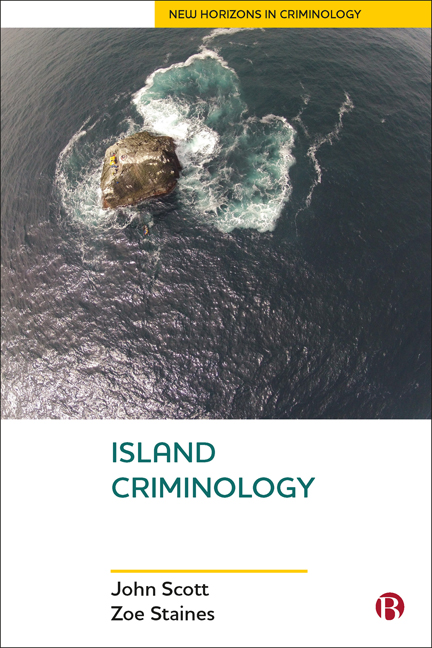8 - Conclusion
Published online by Cambridge University Press: 17 January 2024
Summary
It is debatable whether criminology is a ‘discipline’. Historically it has drawn on many disciplines, most notably sociology. This sociological preoccupation has perhaps given it a temporal character. This noted, and as we have argued throughout this book, geography has always informed criminology. Most of this ‘geographic’ work, perhaps owing to the dominance of Northern criminologies, has been what we have referred to here as spatial in character and empirical. Of less influence have been interpretive approaches looking at place- based characteristics of criminological issues. We have attempted to compensate for this here and have been less concerned with how criminology might solve social problems, including crime, instead largely focusing on how such problems are generated and, indeed, how criminology itself has constructed such problems. In this way we view island criminologies as being as much about problem analysis as they are about problem solving (Schneider, 1985). At any rate, we have endeavoured here to draw upon a broad range of disciplines in the humanities and social sciences to map island criminologies. It is our intention in this book to situate island criminologies within these existing criminological lines of inquiry, while also taking an interdisciplinary, global, and critical approach to exploring how islandness might further inflect extant criminological theorizing. As Thomas (2007, p 22) draws attention to:
Current island studies literature strongly suggests the importance of studying islands, supports the need for gathering islanders together, and asserts the significance of expanding island studies as a ‘nissological interdisciplinarity’.
A distinction which echoes that of problem analysis and problem solving has been made between a vocational (sometimes referred to as administrative or professional) approach to criminology and that of a critical approach. The vocational approach is often empirical and is associated with improving the practices of the criminal justice system in order to reform it. The critical approach tends to be more theoretical and philosophical and is less concerned with improving criminal justice institutions than it is with questioning their existence. The distinction has been an enduring one with appeal to criminologists themselves, especially those who consider themselves part of the critical tradition. But dig deeper, and beneath all this is another distinction which informs criminological traditions and those more broadly in the social sciences, involving human nature.
- Type
- Chapter
- Information
- Island Criminology , pp. 129 - 138Publisher: Bristol University PressPrint publication year: 2023



